GREEN Glossary
AD
B
Better Cotton Initiative (BCI)

The charity is working to improve environmental and social conditions in the cultivation of cotton. The cotton producers, who wish to carry this seal must meet the prescribed criterias at the entry exactly. Ongoing improvements and the fulfillment of other requirements must be ensured. The requirements vary depending on whether they are small farmers or XL plantations. The Seal does not appear on the finished products. bettercotton.org
Blue Angel
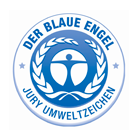
With the Blue Angel everything has started. The longest-serving certification for products and services in the environmental sector began in 1978 on the initiative of the Federal Ministry of the Interior. Since the Blue Angel labels on a voluntary basis products and services, which are classified as environmentally friendly. The following aspects play a role: the economical use of raw materials in the production, the respectful handling of health and safety, durability and sustainable disposal.blauer-engel.de
Bluesign® standard
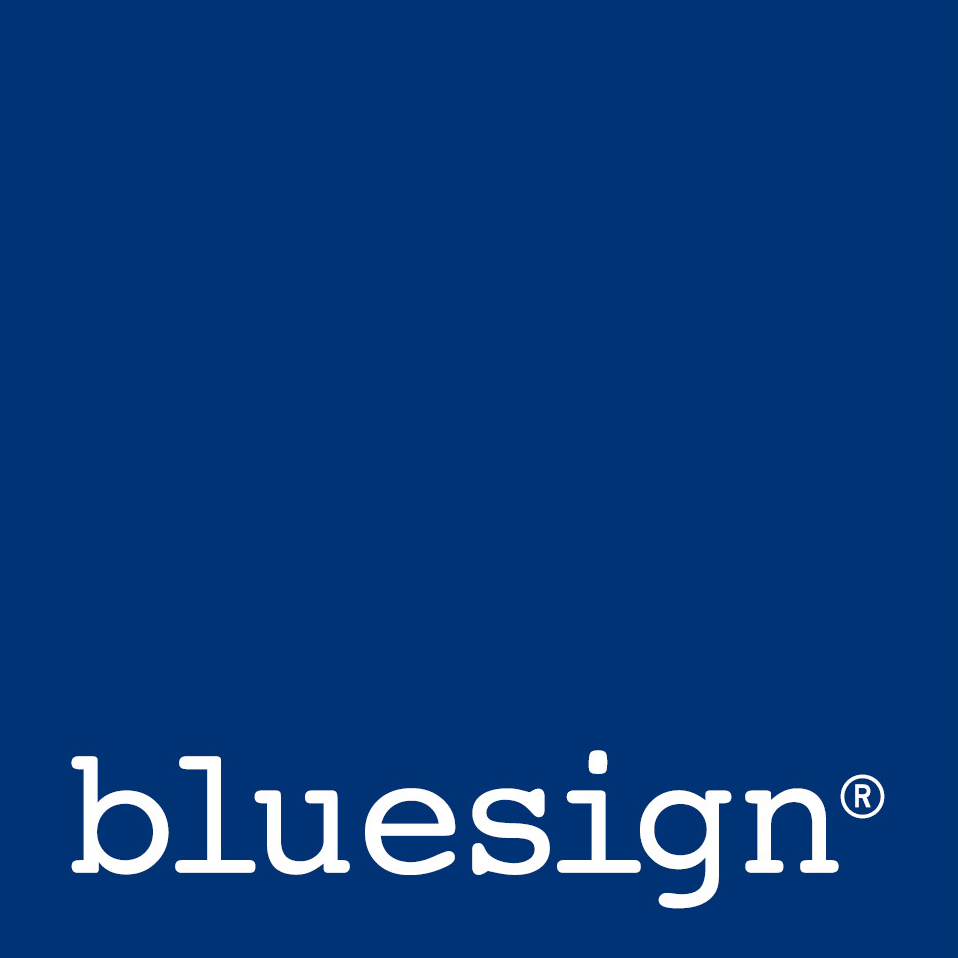
The bluesign® standard guarantees acceptable methods and components for people and the environment throughout the production chain. It is about safety in consumer protection, waste water, emissions, safety and resource productivity. bluesign.com
C
Circular Economy
The aim of recycling is to return the raw materials, used for the product at end of life back into the production process and thus save both resources and avoid waste. Thus, the circular economy is in contrast to the prevailing economic Linear Economy (Throw-away Economy), in which a large part of the products after their use of are thrown in landfills or incinerated.
E
ECONYL®

ECONYL® is a 100 percent regenerated fiber made from nylon waste, such as broken and useless fishing nets, fabrics, old carpets and other valuable materials. With the help of innovative technologies, it is now possible to produce a premium yarn, the so-called ECONYL® yarn, from which finest materials can be woven. Aquafil, one of the world's leading companies in the synthetic fiber industry, has succeeded in closing the cycle. The revolutionary material is used, for example, in the tights of the German traditional company Kunert, which launched a sustainable tights collection with Kunert Blue in January 2017. Further information about econyl.com/de
EU Ecolabel / Euro flower / European Ecolabel
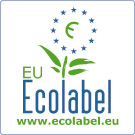
The EU Ecolabel is an internationally recognized seal of approval, which serves since 1992 to make environmentally friendly products to consumers more easily identifiable. The entire product life cycle, including environmentally production and disposal is illuminated when evaluating a product. It applies to both natural, as well as synthetic fibers. The European Union Ecolabelling Board (EUEB) is responsible for the seal. Owner is the European Commission. The certificate is recognized in all EU countries incl. Norway, Liechtenstein and Iceland. In Germany, the German Institute for asset protection and labeling (RAL) and the Federal Environment Agency for examining and awarding the label are responsible (for three years).eu-ecolabel.de
F
Fair Wear Foundation
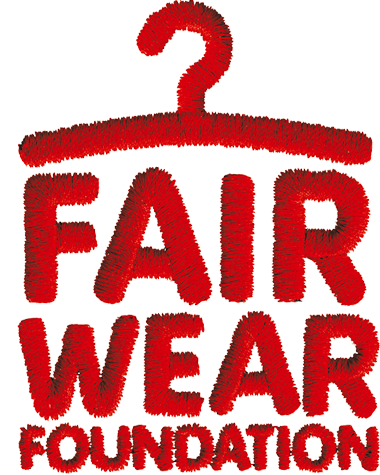
The non-profit Fair Wear Foundation (FWF) has set itself the goal of improving the working conditions in the textile industry. The FWF focuses on the time, when the substances are processed to textile products (clothing). The member companies are regularly checked and evaluated in the implementation of the requirement catalog of the FWF. These controls also take place at the production sites. In addition, the Fair Wear Foundation developed approaches by which human rights can be better enforced in the delivery process.fairwear.org
G
GOTS (Global Organic Textile Standard)
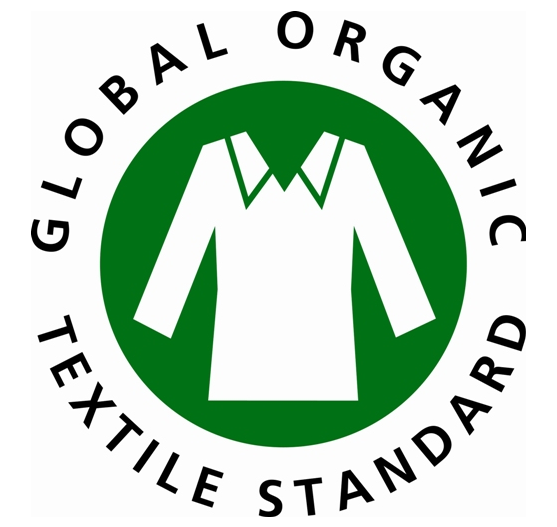
GOTS is one of the strictest and most well-known label for ecological clothes. Since 2008, it identifies products, whose entire production is in accordance with certain environmental and social standards. GOTS certified clothing must be made of 90 percent natural fibers, at least 70 percent organic. In addition, social and labor standards must be respected. These include: no child or forced labor, compliance with prevailing local minimum wages, acceptable working conditions and health and safety measures.
global-standard.org
I
IVN (International Association Natural Textile Industry E.V)
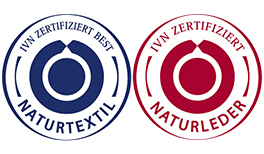
The International Association Natural Textile Industry e.V. (IVN) is a professional association, which have joined since 1989 companies from nature textile production (textiles and leather) (among others hessnatur, Alnatura), have the highest standards of environmental protection, social responsibility, product quality and consumer protection. The IVN awards both quality marks IVN Naturtextil Best and IVN Natural Leather, whose guidelines document the highest achievable ecological and social standards. As part of the IVN certification all companies, involved in the production chain are tested by independent institutes.
naturtextil.de
L
Linear Economy / throwaway economy
Under the prevailing Linear Economy (also throw-away Economy) lands large parts of its production in landfills or incinerated. The raw materials are not recycled back into the production process at the end of its life. Thus, the Linear Economy is in direct contrast to the Circular Economy, in which the raw materials used for the product, returned at the end of its life in the production process and saved in this way both resources and waste is avoided.
N
Nanai leather / Salmon leather
Nanai leather comes from the world's only company, that can demonstrate, that its salmon leather (tanned salmon skin) is 100 percent free of chromium tanned and dyed. Nanai leather is thinner than calfskin, very elastic, durable and water-repellent. Perfect for fabulous shoes, bags & Co. (inter alia at Alina Schürfeld, NINE TO FIVE)
Naturtextil IVN Best certification
The International Association Natural Textile Industry e.V. (IVN) is a professional association, which have joined since 1989 companies from nature textile production (textiles and leather) (among others hessnatur, Alnatura), have the highest standards of environmental protection, social responsibility, product quality and consumer protection. The IVN awards both quality marks IVN Naturtextil Best and IVN Natural Leather, whose guidelines document the highest achievable ecological and social standards. As part of the IVN certification all companies, involved in the production chain are tested by independent institutes. naturtextil.de
naturtextil.de
O
Oeko-Tex® Standard 100
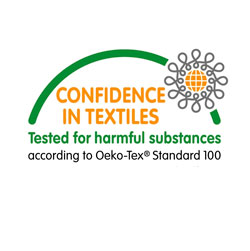
Early 90s increased the interest of consumers to safe textiles. To meet the need for transparency, the Austrian Textile Research Institute (ÖTI) and the German Hohenstein Research Institute have developed the Oeko-Tex® Standard 100. For the first time a uniform policy for consumers and producers was established. There are only certified products, where all the elements are below precisely defined pollutant limits. In addition to the safety to the skin contact of the fabric, which also relates to accessories such as sewing thread, buttons, zippers, etc. oeko-tex.com
Organic / Organic Cotton
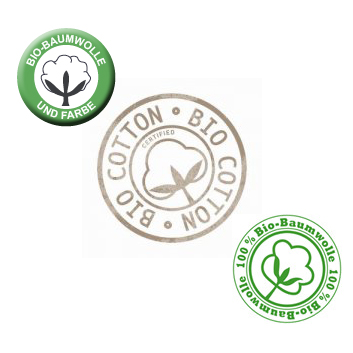
About 25 percent of the insecticides used worldwide and eleven percent of the pesticides alone, accounts for cotton production. The water consumption is extremely high with one cubic meter of water per kilogram of cotton fibers. Numerous seals and certificates have indeed made the production of organic cotton is not necessarily transparent. Currently, however, the production of organic cotton ensures, that there is no child labor in the respective organic plantations, that will dispense the insignificant use of pesticides and that the Organic Cotton Farmers get fair prices. Unfortunately, the proportion of organic cotton (organic cotton) with 1 to 2 percent of global cotton production is still negligible (current numbers on organicexchange.org).
P
PETA-Approved vegan
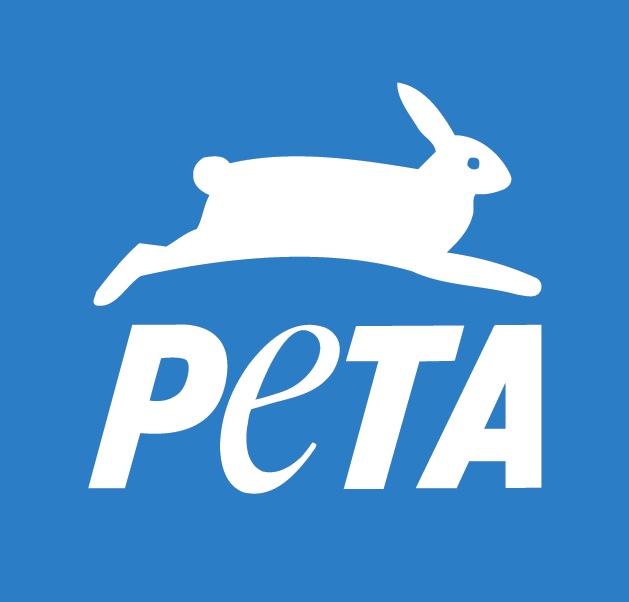
Products, which have been awarded the PETA-Approved vegan logo, are 100 percent vega. Leather, wool, silk and natural fur are just as taboo as small parts that have animal ingredients in the preparation. Accordingly, shoe glue of bone glue or pearl buttons are prohibited. Unlike many other seals that seal is free. Because of this, even small, new labels, that meet the requirements, use this seal.
peta.de
Pinatex / pineapple leather
Shoes, bags, belts, car seats: If you want to avoid animal leather, there is a new vegan alternative with pineapple leather. The Spanish designer Carmen Hijosa has developed a method with its Startup "Pineapple Anam" that pineapple leaves - left over from the harvest as a waste product - converts to a non-woven fabric, which looks similar to and as stable as animal leather. Small designers like Maravilla Bags (Mallorca) have already pineapple leather bags in their range. Puma and Camper experiments with prototypes.
ananas-anam.com
R
Recycling
During the recycling waste products are used again, or returned to their starting materials for secondary materials. Secondary materials are raw materials which are obtained through recycling of waste material. Resourceful eco-fashion labels have discovered disused products for themselves and make by recycling the "disused" fiber great new fashion (as MUD jeans). As a result, among other things the resource-intensive cotton production is reduced and the production of polyester can be reduced from crude oil.
S
Salmon leather / nanai leather
Salmon leather (tanned salmon skin) is a byproduct of fishing, which can be accessed for the eco-fashion for their production (among others accessories such as bags, shoes and belts), should be without it reared, caught or killed a salmon.
Nanai leather comes from the world's only company, that can demonstrate, that its salmon leather is 100 percent free of chromium tanned and dyed. Nanai leather is thinner than calfskin, very elastic, durable and water-repellent. Perfect for fabulous shoes, bags & Co. (inter alia at Alina Schürfeld, NINE TO FIVE)
T
Tencel / Lyocell
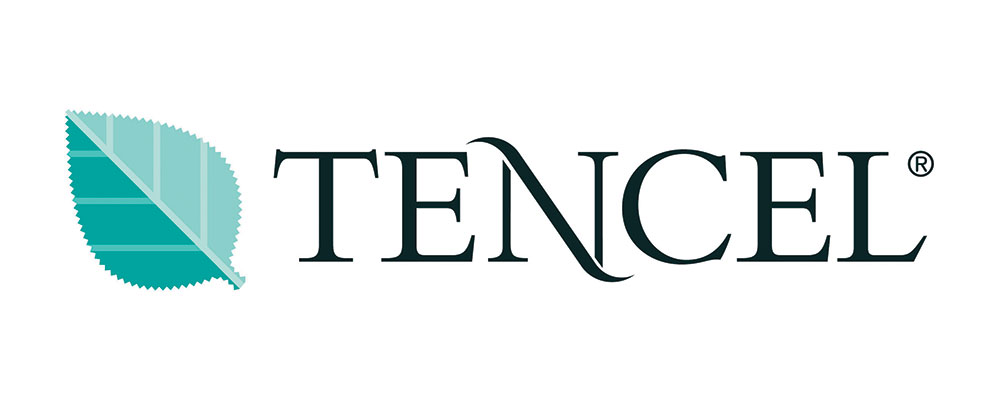
Again and again you hear the terms Tencel and Lyocell in connection with sustainable fashion. Anyone who has already worn a Tencel garment in his hand or even on the body knows what a fantastic material is. But what is Tencel actually? Tencel is a cellulose fiber made from natural raw materials. Cellulose is obtained from wood - in this case from Asian or South American eucalyptus wood from sustainable forestry. The fiber is produced in a closed circuit and has been awarded the "European Award for the Environment" by the European Union. In addition to the extremely high wearing comfort and the versatile application for bed linen, home textiles and more, the sustainable aspects that make Tencel the future fiber are first and foremost, the solvents required for the manufacturing process are reused almost 100 percent. On the other hand, a fraction of the amount of water is required in the production process, as is the case with the production of conventional chemical fibers. Another plus: in contrast to e.g. Cotton, no artificial irrigation and no use of pesticides is necessary for the cultivation of eucalyptus. And Tencel is biodegradable. Tencel is offered by the Austrian Lenzing AG.
B
Better Cotton Initiative (BCI)

The charity is working to improve environmental and social conditions in the cultivation of cotton. The cotton producers, who wish to carry this seal must meet the prescribed criterias at the entry exactly. Ongoing improvements and the fulfillment of other requirements must be ensured. The requirements vary depending on whether they are small farmers or XL plantations. The Seal does not appear on the finished products. bettercotton.org
Blue Angel

With the Blue Angel everything has started. The longest-serving certification for products and services in the environmental sector began in 1978 on the initiative of the Federal Ministry of the Interior. Since the Blue Angel labels on a voluntary basis products and services, which are classified as environmentally friendly. The following aspects play a role: the economical use of raw materials in the production, the respectful handling of health and safety, durability and sustainable disposal. blauer-engel.de
Bluesign® standard

The bluesign® standard guarantees acceptable methods and components for people and the environment throughout the production chain. It is about safety in consumer protection, waste water, emissions, safety and resource productivity. bluesign.com
C
Circular Economy
The aim of recycling is to return the raw materials, used for the product at end of life back into the production process and thus save both resources and avoid waste. Thus, the circular economy is in contrast to the prevailing economic Linear Economy (Throw-away Economy), in which a large part of the products after their use of are thrown in landfills or incinerated.
E
ECONYL®

ECONYL® is a 100 percent regenerated fiber made from nylon waste, such as broken and useless fishing nets, fabrics, old carpets and other valuable materials. With the help of innovative technologies, it is now possible to produce a premium yarn, the so-called ECONYL® yarn, from which finest materials can be woven. Aquafil, one of the world's leading companies in the synthetic fiber industry, has succeeded in closing the cycle. The revolutionary material is used, for example, in the tights of the German traditional company Kunert, which launched a sustainable tights collection with Kunert Blue in January 2017. Further information about econyl.com/de
EU Ecolabel / Euro flower / European Ecolabel

The EU Ecolabel is an internationally recognized seal of approval, which serves since 1992 to make environmentally friendly products to consumers more easily identifiable. The entire product life cycle, including environmentally production and disposal is illuminated when evaluating a product. It applies to both natural, as well as synthetic fibers. The European Union Ecolabelling Board (EUEB) is responsible for the seal. Owner is the European Commission. The certificate is recognized in all EU countries incl. Norway, Liechtenstein and Iceland. In Germany, the German Institute for asset protection and labeling (RAL) and the Federal Environment Agency for examining and awarding the label are responsible (for three years). eu-ecolabel.de
F
Fair Wear Foundation

The non-profit Fair Wear Foundation (FWF) has set itself the goal of improving the working conditions in the textile industry. The FWF focuses on the time, when the substances are processed to textile products (clothing). The member companies are regularly checked and evaluated in the implementation of the requirement catalog of the FWF. These controls also take place at the production sites. In addition, the Fair Wear Foundation developed approaches by which human rights can be better enforced in the delivery process.
fairwear.org
G
GOTS (Global Organic Textile Standard)

GOTS is one of the strictest and most well-known label for ecological clothes. Since 2008, it identifies products, whose entire production is in accordance with certain environmental and social standards. GOTS certified clothing must be made of 90 percent natural fibers, at least 70 percent organic. In addition, social and labor standards must be respected. These include: no child or forced labor, compliance with prevailing local minimum wages, acceptable working conditions and health and safety measures.
global-standard.org
I
IVN (International Association Natural Textile Industry E.V)

The International Association Natural Textile Industry e.V. (IVN) is a professional association, which have joined since 1989 companies from nature textile production (textiles and leather) (among others hessnatur, Alnatura), have the highest standards of environmental protection, social responsibility, product quality and consumer protection. The IVN awards both quality marks IVN Naturtextil Best and IVN Natural Leather, whose guidelines document the highest achievable ecological and social standards. As part of the IVN certification all companies, involved in the production chain are tested by independent institutes.
naturtextil.de
L
Linear Economy / throwaway economy
Under the prevailing Linear Economy (also throw-away Economy) lands large parts of its production in landfills or incinerated. The raw materials are not recycled back into the production process at the end of its life. Thus, the Linear Economy is in direct contrast to the Circular Economy, in which the raw materials used for the product, returned at the end of its life in the production process and saved in this way both resources and waste is avoided.
N
Nanai leather / Salmon leather
Nanai leather comes from the world's only company, that can demonstrate, that its salmon leather (tanned salmon skin) is 100 percent free of chromium tanned and dyed. Nanai leather is thinner than calfskin, very elastic, durable and water-repellent. Perfect for fabulous shoes, bags & Co. (inter alia at Alina Schürfeld, NINE TO FIVE)
Naturtextil IVN Best certification
The International Association Natural Textile Industry e.V. (IVN) is a professional association, which have joined since 1989 companies from nature textile production (textiles and leather) (among others hessnatur, Alnatura), have the highest standards of environmental protection, social responsibility, product quality and consumer protection. The IVN awards both quality marks IVN Naturtextil Best and IVN Natural Leather, whose guidelines document the highest achievable ecological and social standards. As part of the IVN certification all companies, involved in the production chain are tested by independent institutes.
naturtextil.de
O
Oeko-Tex® Standard 100

Early 90s increased the interest of consumers to safe textiles. To meet the need for transparency, the Austrian Textile Research Institute (ÖTI) and the German Hohenstein Research Institute have developed the Oeko-Tex® Standard 100. For the first time a uniform policy for consumers and producers was established. There are only certified products, where all the elements are below precisely defined pollutant limits. In addition to the safety to the skin contact of the fabric, which also relates to accessories such as sewing thread, buttons, zippers, etc. oeko-tex.com
Organic / Organic Cotton

About 25 percent of the insecticides used worldwide and eleven percent of the pesticides alone, accounts for cotton production. The water consumption is extremely high with one cubic meter of water per kilogram of cotton fibers. Numerous seals and certificates have indeed made the production of organic cotton is not necessarily transparent. Currently, however, the production of organic cotton ensures, that there is no child labor in the respective organic plantations, that will dispense the insignificant use of pesticides and that the Organic Cotton Farmers get fair prices. Unfortunately, the proportion of organic cotton (organic cotton) with 1 to 2 percent of global cotton production is still negligible (current numbers on organicexchange.org).
P
PETA-Approved vegan

Products, which have been awarded the PETA-Approved vegan logo, are 100 percent vega. Leather, wool, silk and natural fur are just as taboo as small parts that have animal ingredients in the preparation. Accordingly, shoe glue of bone glue or pearl buttons are prohibited. Unlike many other seals that seal is free. Because of this, even small, new labels, that meet the requirements, use this seal.
peta.de
Pinatex / pineapple leather
Shoes, bags, belts, car seats: If you want to avoid animal leather, there is a new vegan alternative with pineapple leather. The Spanish designer Carmen Hijosa has developed a method with its Startup "Pineapple Anam" that pineapple leaves - left over from the harvest as a waste product - converts to a non-woven fabric, which looks similar to and as stable as animal leather. Small designers like Maravilla Bags (Mallorca) have already pineapple leather bags in their range. Puma and Camper experiments with prototypes. ananas-anam.com
R
Recycling
During the recycling waste products are used again, or returned to their starting materials for secondary materials. Secondary materials are raw materials which are obtained through recycling of waste material. Resourceful eco-fashion labels have discovered disused products for themselves and make by recycling the "disused" fiber great new fashion (as MUD jeans). As a result, among other things the resource-intensive cotton production is reduced and the production of polyester can be reduced from crude oil.
S
Salmon leather / nanai leather
Salmon leather (tanned salmon skin) is a byproduct of fishing, which can be accessed for the eco-fashion for their production (among others accessories such as bags, shoes and belts), should be without it reared, caught or killed a salmon.
Nanai leather comes from the world's only company, that can demonstrate, that its salmon leather is 100 percent free of chromium tanned and dyed. Nanai leather is thinner than calfskin, very elastic, durable and water-repellent. Perfect for fabulous shoes, bags & Co. (inter alia at Alina Schürfeld, NINE TO FIVE)
S
Tencel / Lyocell

Again and again you hear the terms Tencel and Lyocell in connection with sustainable fashion. Anyone who has already worn a Tencel garment in his hand or even on the body knows what a fantastic material is. But what is Tencel actually? Tencel is a cellulose fiber made from natural raw materials. Cellulose is obtained from wood - in this case from Asian or South American eucalyptus wood from sustainable forestry. The fiber is produced in a closed circuit and has been awarded the "European Award for the Environment" by the European Union. In addition to the extremely high wearing comfort and the versatile application for bed linen, home textiles and more, the sustainable aspects that make Tencel the future fiber are first and foremost, the solvents required for the manufacturing process are reused almost 100 percent. On the other hand, a fraction of the amount of water is required in the production process, as is the case with the production of conventional chemical fibers. Another plus: in contrast to e.g. Cotton, no artificial irrigation and no use of pesticides is necessary for the cultivation of eucalyptus. And Tencel is biodegradable. Tencel is offered by the Austrian Lenzing AG.


